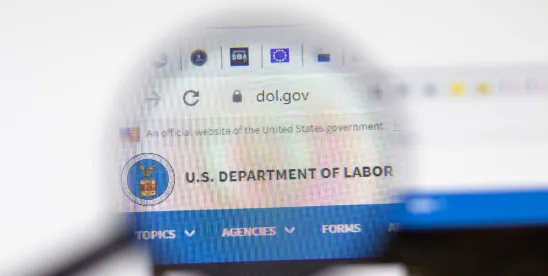The U.S. Department of Labor (DOL) has issued a proposed rule to end the practice of paying subminimum wages to certain workers with disabilities.
The proposed rule, announced December 3, 2024, marks the first rulemaking related to the subminimum wage in 35 years, although the regulation had been included in the DOL’s long-term regulatory agenda “for many years,” the DOL notes. The subminimum wage regulation saw its last substantive update in 1989.
If enacted, the rule would mostly impact community-based rehabilitation and training programs.
Subminimum Wage
The Fair Labor Standards Act (FLSA) allows employers to pay productivity-based wages of less than the federal minimum hourly rate (currently $7.25) to certain workers with disabilities. FLSA, Section 14(c), allows the Secretary of Labor to issue certificates to employers permitting them to pay a subminimum wage “when necessary to prevent curtailment of opportunities for employment.”
There is no single wage rate for employees working under section 14(c) certificates. Hourly pay varies based on each individual employee’s productivity in the job they perform. Data from May 2024 show median average earnings of $3.46 per hour for employees paid under section 14(c). Data from 14(c) certificates that were valid October 2023 through March 2024 show that approximately 49% of individuals earned $3.50 per hour or less.
Under the proposed rule, the DOL would stop issuing new certificates immediately once the final rule took effect. Employers with existing certificates would have a three-year phase-out period to cease paying the subminimum wage to workers with disabilities.
Declining Numbers
Use of the subminimum wage program has waned in recent years, and the number of certificate holders has declined sharply. Currently there are 801 certificate holders, operating in 38 states, according to recent data. The overwhelming majority (93 percent) are community rehabilitation programs, nonprofit agencies that provide rehabilitation services and jobs for individuals with disabilities, typically in facility-based sheltered settings.
Only 30 private-sector, for-profit businesses hold 14(c) certificates, representing 4 percent of total certificate holders. Hospitals or residential care facilities that employ patients and “school work experience programs” comprise the remainder of certificate holders.
The number of employees paid subminimum wages has fallen by about 90 percent since 2001, according to Government Accountability Office (GAO) data. As of May 1, 2024, only about 40,579 workers with disabilities were being paid subminimum wages. Ninety percent of 14(c ) workers are individuals with intellectual and developmental disabilities; however, many individuals with intellectual and developmental disabilities in the workforce are not 14(c) workers and are paid full wages. DOL’s preliminary assessment found that the total number of working individuals with intellectual and developmental disabilities is at least twice the total number of individuals working under section 14(c) certificates.
No Longer Needed?
The DOL launched a comprehensive review of the Section 14(c) program in 2023 and obtained input from certificate holders, workers with disabilities, and other stakeholders. The DOL issued the proposed rule after “preliminarily” concluding that that subminimum wage program is no longer necessary to boost work opportunities for individuals with disabilities. Acting Secretary of Labor Julie Su cited the “significant legal and policy developments that have dramatically expanded employment opportunities and rights for individuals with disabilities” since the FLSA was enacted in 1938.
It remains to be seen whether the incoming administration will finalize the proposed rule. The idea of eliminating the subminimum wage, however, has gained some bipartisan support in Congress. The Transformation to Competitive Integrated Employment Act would phase out the use of subminimum wage certificates over five years. The bipartisan measure would provide grants to assist subminimum wage employers in transitioning out of the use of 14(c) waivers. (The Raise the Wage Act, a Democratic bill to increase the standard federal hourly minimum wage, also would eliminate the subminimum wage for individuals with disabilities.) Opposition remains, however. Virginia Foxx, Republican Chair of the House Education and Workforce Committee, called the proposed rule “misguided and irresponsible” and urged the DOL to withdraw it.
More than a dozen states already have barred private employers from paying subminimum wages to workers with disabilities, or have prohibited subminimum wages in state contracts. Most recently, on November 21, 2024, Illinois passed the Dignity in Pay Act, which gradually phases out the subminimum wage by 2029.
Impact on 14(c) Participants
The DOL anticipates when a final rule is enacted, workers currently paid subminimum wages under Section 14(c) will transition into positions that pay the full wage. The rule would not require current subminimum wage workers to leave their current jobs, where they typically benefit from rehabilitation and training services for a portion of their day. Section 14(c)certificate holders could continue to provide these services and maintain the current work setting, and would only be required to pay the full federal minimum wage for those hours in the day in which the individual is engaged in productive work.
Rulemaking
The DOL has asked for comments on the proposed rule, particularly on whether the three-year phase-in period should be shorter or longer, and whether one-time extensions should be granted to current certificate holders for good cause.
The public comment period closes on Jan. 17, 2025. Comments can be submitted here: https://www.federalregister.gov/public-inspection/2024-27880/employment-of-workers-with-disabilities-under-section-14c-of-the-fair-labor-standards-act.




 />i
/>i
